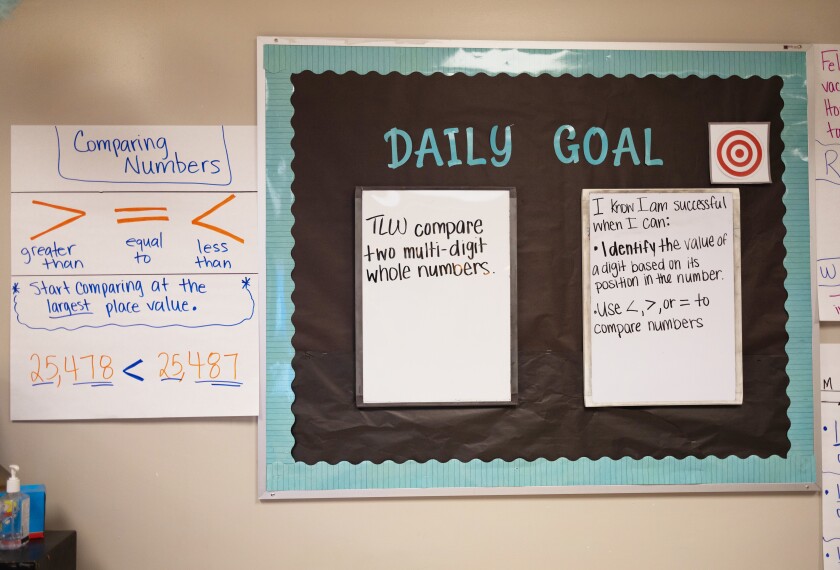
| |
| Assistant Secretary of Education C. Kent McGuire, left, listens as Stanford University professor R. James Milgram outlines his criticism of the list of department-approved mathematics programs. —Benjamin Tice Smith |
The “math wars” came to Capitol Hill last week during a House hearing on 10 mathematics programs that received the Department of Education’s seal of approval last fall.
Although the list is purely advisory, the department’s selection of “promising” and “exemplary” programs has engendered controversy since federal officials unveiled the choices in October. In November, nearly 200 mathematicians, physicists, and other scholars took out a full-page advertisement in TheWashington Post to air their opposition to the choices, which they said neglected essential skills. (“Academics Urge Riley To Reconsider Math Endorsements,” Nov. 24, 1999.)
At the hearing Feb. 2, held jointly by two subcommittees of the House Education and the Workforce Committee, some lawmakers wondered aloud whether the department had overstepped its bounds by endorsing the programs—a task Congress had ordered it to do in 1994. Federal law prohibits the federal government from dictating curricula, but department officials have for years evaluated programs for their effectiveness.
“While I believe there is a limited role for the federal government to influence the choice of a quality math curriculum,” said Rep. Michael N. Castle, a Republican from Delaware who is the chairman of the Subcommittee on Early Childhood, Youth, and Families, which co-hosted the hearing. “I also believe that the federal government must take care not to ... use that influence to pressure state and local schools to implement national math standards.”
The programs, aimed variously at students in kindergarten through 12th grade, all reflect national standards for teaching math that were written by the National Council of Teachers of Mathematics some 10 years ago. In 1996, when the department formed an expert panel to review math and science curricula, 43 states had adopted the standards. But the standards have since run into trouble in several states—notably in California—as parents and some mathematicians argued that they veered too far from traditional teaching.
“Standard algorithms for operations like multiplication and division are not taught, but students are advised to construct their own algorithms,” R. James Milgram, the Stanford University math professor who initiated the newspaper ad, told the subcommittees. He also said that the department’s expert panel had failed to include an adequate number of research mathematicians and had chosen programs that shortchanged algebra and lacked solid research evidence to back them up.
‘Good-Faith Effort’

| |
| Rep. Dale Kildee, D-Mich., says the new math programs could compound the problems faced by inexperienced teachers. —Benjamin Tice Smith |
The legislators also heard from Rachel Tronstein, a University of Michigan freshman who said she had taken four years of one of the programs on the list as an honor roll high school student in Bloomfield Hills, Mich. Despite private tutoring, a solid math background in elementary and middle school, and summer university math courses, Ms. Tronstein said, she had struggled to earn a B-minus in calculus in her first year of college.
C. Kent McGuire, the Education Department’s assistant secretary for educational research and improvement, said the expert panel’s work represented “a good-faith effort” to fulfill its congressional mandate.
As part of the two-year review process, each program went through several stages of review. Math educators assessed each program for content, and program-evaluation experts examined the program’s research evidence, Mr. McGuire said. Research mathematicians were not “consciously excluded” from the expert panel, he said.
Part of the problem, several lawmakers at the hearing surmised, may be that not enough teachers have the needed math background to teach the new-breed programs.
“Putting in experimental curricula only compounds the problems those teachers have to deal with,” said Rep. Dale E. Kildee, D-Mich.




